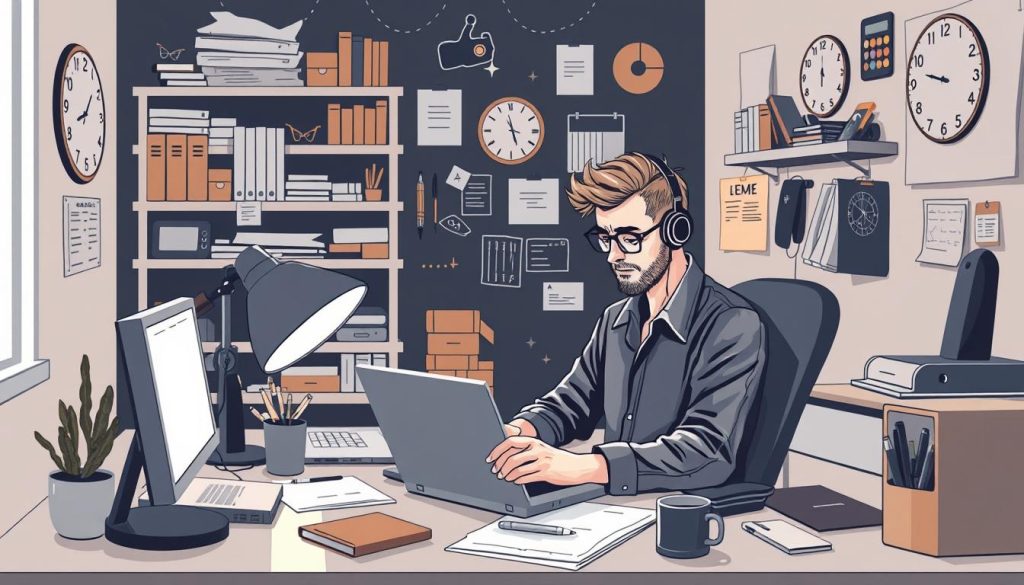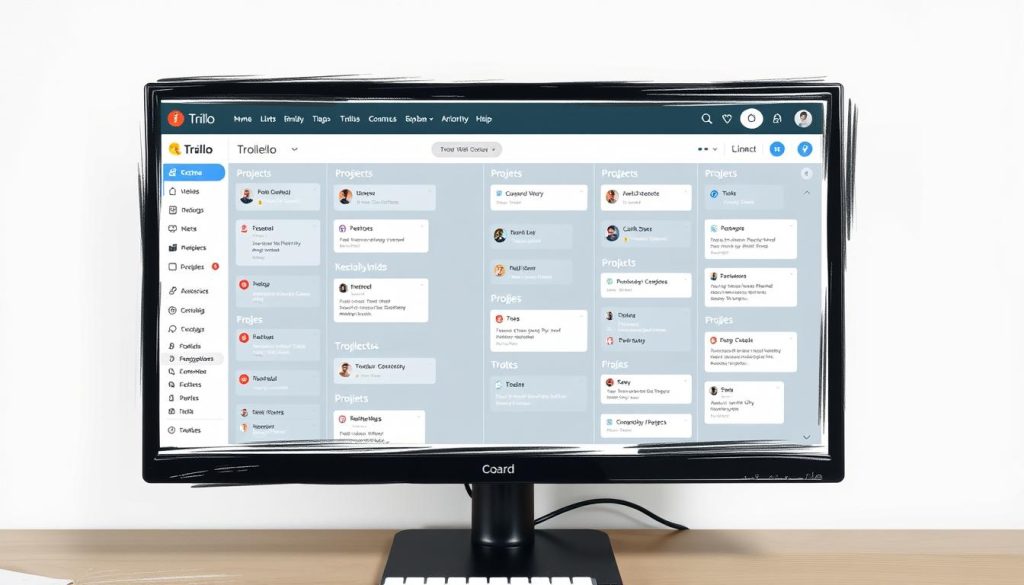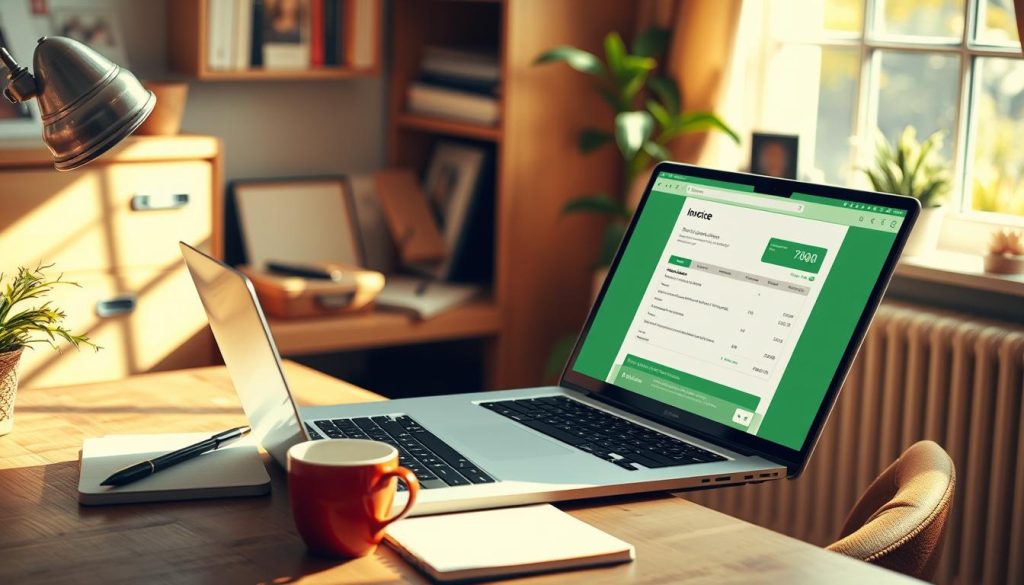Are you struggling to manage your time effectively as a freelancer, often finding yourself procrastinating on projects only to rush to meet deadlines?
Freelancing offers the freedom to determine your own schedule, but this flexibility can sometimes become a double-edged sword when it comes to maintaining productivity. Without a structured routine, it’s easy to get sidetracked and lose focus.
To overcome these challenges, it’s essential to develop strategies that help you stay on track and maximize your efficiency. By implementing the right techniques, you can accomplish more in less time and achieve a better work-life balance.
Table of Contents
Key Takeaways
- Discover practical time management techniques tailored to the freelance lifestyle.
- Learn how to create a distraction-free environment that fosters deep, focused work.
- Understand the importance of establishing clear boundaries between your work and personal life.
- Find out how to optimize your energy and attention for maximum productivity.
- Explore sustainable productivity practices that prevent burnout and support long-term success.
The Unique Productivity Challenges Freelancers Face
The flexibility of freelancing is a double-edged sword, offering autonomy while also presenting unique productivity challenges. As a freelancer, you have the freedom to decide when and how you work, but this flexibility can sometimes become a productivity pitfall if not managed correctly.
Freelancers face a unique paradox: the freedom that attracts many to freelancing is often the same element that creates productivity challenges. Without the structure of traditional employment, freelancers must create their own frameworks for productivity, which requires significant self-discipline and intentionality.
Freedom vs. Structure: Finding the Balance
Finding the right balance between flexibility and structure is essential for freelancers. Too much rigidity defeats the purpose of freelancing, while too little structure undermines productivity. Establishing consistent routines while maintaining adaptability is key to overcoming these unique challenges. For instance, setting a routine can help you stay on track with your tasks and manage your work time effectively.
As highlighted in a related article on the differences between freelance and traditional, understanding the nuances of freelance work is crucial for navigating its challenges.
Common Productivity Pitfalls in Freelancing
Common productivity pitfalls for freelancers include irregular work hours, difficulty prioritizing multiple client projects, and the absence of external accountability structures. Many freelancers struggle with time tracking and estimating how long projects will take, leading to scheduling conflicts and deadline pressure. The isolation of freelance work can also impact motivation and momentum, without colleagues or managers to provide feedback and encouragement.
- Irregular work hours and difficulty in maintaining a consistent work schedule.
- Difficulty prioritizing tasks across multiple client projects.
- Lack of external accountability, leading to procrastination or underworking.
- Environmental distractions, such as working from home where personal responsibilities and interruptions are common.
Recognizing these challenges is the first step toward implementing effective strategies to address them. By understanding the unique productivity challenges freelancers face, you can begin to develop the tools and routines necessary to enhance your productivity and achieve a better work-life balance.
Essential Productivity Tips for Freelancers

To succeed as a freelancer, it’s essential to develop effective productivity habits. Freelancing offers the freedom to choose your projects and work at your own pace, but it also demands discipline and a structured approach to managing your time and tasks.
Setting Clear Boundaries Between Work and Personal Life
Establishing a clear distinction between your work and personal life is fundamental to maintaining sustainable productivity. This involves setting dedicated work hours and communicating these boundaries to your clients, family, and friends.
By doing so, you can avoid the pitfall of overworking or allowing personal activities to encroach on your work time. Developing morning and evening rituals can also help signal the beginning and end of your workday, making it easier to transition between professional and personal time.
Establishing a Consistent Work Routine
Creating a consistent routine helps train your brain to enter « work mode » at specific times, even without the external structure of a traditional office environment. This can involve allocating specific hours for different projects or types of work, ensuring balanced attention across all your professional commitments.
Using time blocking to schedule your tasks can also enhance your productivity by minimizing context switching and maximizing efficiency. It’s also crucial to align your most challenging work with your peak energy periods, typically within the first few hours after waking.
The Power of Single-Tasking vs. Multitasking
Focusing on one task at a time leads to higher quality work and faster completion times, contrary to the myth of multitasking. Batching similar tasks together, such as client communications or creative work, can also help you stay focused and efficient.
By implementing these productivity tips, freelancers can better manage their work, reduce stress, and achieve a better work-life balance every day.
Time Management Techniques That Actually Work

Mastering time management is a game-changer for freelancers, enabling them to work smarter, not harder. Effective time management techniques can help you stay focused, increase productivity, and achieve a better work-life balance.
Time Blocking: Structuring Your Freelance Day
Time blocking is a powerful scheduling method that involves allocating specific blocks of time to particular tasks. By categorizing tasks into types, such as client calls, campaign strategy, content creation, and admin work, you can create a structured plan for your day. Using a digital calendar or physical planner, assign each task a time slot to transform your vague to-do lists into concrete schedules.
The Pomodoro Technique for Focused Work Sessions
The Pomodoro Technique is a time management method that leverages the psychology of time constraints to boost focus. By working in 25-minute sprints followed by 5-minute breaks, you create a sense of urgency while preventing mental fatigue. This technique is particularly effective for freelancers who struggle with procrastination or feel overwhelmed by large projects.
Aligning Tasks with Your Energy Levels
Understanding your personal energy patterns is crucial for effective time management. Track when you naturally feel most alert and creative, then schedule your most demanding tasks during these peak periods. Reserve lower-energy periods for administrative tasks, email management, and other less cognitively demanding activities. By aligning your tasks with your energy levels, you can maximize your productivity and achieve more in less time.
To further optimize your time management, consider experimenting with different work session durations to find your optimal focus period. Some people work best in 25-minute sprints, while others may prefer 45 or 90-minute deep work sessions. Regardless of the technique you choose, consistency and self-awareness about how you’re spending your time are key to achieving your goals.
Creating a Distraction-Free Workspace
A well-designed workspace is crucial for freelancers to boost their productivity and efficiency. As a freelancer, your work environment significantly impacts your ability to focus and deliver quality work. To maximize your productivity, it’s essential to create a workspace that is free from distractions and tailored to your specific needs.
Designing Your Ideal Home Office Environment
When designing your home office, prioritize functionality over aesthetics to ensure your workspace supports your freelance specialty. Position your desk to minimize visual distractions, ideally facing a wall or a window with a non-distracting view. Consider the layout of your home and place your workspace in a quiet area, away from high-traffic zones. You can also boost your productivity and efficiency by optimizing your workspace.
- Minimize clutter and keep your workspace organized to reduce stress and improve focus.
- Use storage solutions to keep essential items within reach while maintaining a clean and tidy workspace.
- Personalize your space with minimal, purposeful items that inspire creativity without creating visual clutter.
Managing Environmental Factors: Noise, Lighting, and Ergonomics
Managing environmental factors such as noise, lighting, and ergonomics is crucial for creating a distraction-free workspace. Invest in proper lighting to reduce eye strain and maintain energy levels. Natural light is ideal, but supplement with task lighting positioned to eliminate screen glare. Consider using noise-canceling headphones or white noise machines to manage noise distractions.
- Ergonomics play a significant role in preventing physical discomfort that disrupts concentration. Ensure your chair, desk, and accessories are properly adjusted.
- Maintain a comfortable temperature between 70-72°F (21-22°C) to optimize cognitive performance.
- Consider the psychological impact of color in your workspace, using blues and greens to enhance focus and calm.
Digital Tools to Boost Your Freelance Productivity
Freelancers can significantly enhance their productivity by utilizing a range of digital tools designed to streamline workflows and minimize distractions. In today’s digital environment, it’s easier than ever to stay focused and manage multiple projects efficiently.
Distraction-Blocking Apps and Extensions
Distraction-blocking apps like Freedom, Cold Turkey, and Forest help enforce digital boundaries by temporarily restricting access to social media, news sites, and other attention-grabbing platforms during designated work periods.

- Freedom blocks distracting websites and apps across all your devices.
- Cold Turkey offers customizable blocking options to fit your work style.
- Forest gamifies productivity by growing a virtual forest as you stay focused.
Project and Task Management Tools
Project management tools such as Asana, Trello, and Monday.com provide visual frameworks for organizing multiple client projects, tracking deadlines, and managing complex workflows.

- Asana helps you track work and manage tasks across teams.
- Trello uses boards, lists, and cards to organize tasks.
- Monday.com offers a customizable workflow management system.
Financial and Invoice Management Software
Financial management software like FreshBooks, QuickBooks, and Wave automates invoicing, expense tracking, and tax preparation—administrative tasks that often drain creative energy.

- FreshBooks simplifies invoicing and expense tracking.
- QuickBooks offers comprehensive financial management solutions.
- Wave provides free invoicing and financial tools for freelancers.
Deep Work Strategies for Freelancers
The concept of deep work, coined by Cal Newport, offers a powerful approach for freelancers to enhance their focus and output. Deep work is about focusing without distraction on a cognitively demanding task, pushing your brain to its limit for an extended period. In a world filled with distractions, from constant emails and social media to open office structures, adopting deep work strategies is crucial for delivering high-quality work.
Implementing Cal Newport’s Deep Work Theory
Cal Newport’s Deep Work theory provides a framework for freelancers to produce high-value work. According to Newport, deep work is defined as « professional activities performed in a state of distraction-free concentration that push your cognitive capabilities to their limit. » To implement this, freelancers can adopt various philosophies:
- The Monastery Philosophy involves eliminating distractions for extended periods, which can be adapted through « deep work retreats. »
- The Bimodal Philosophy alternates between deep work periods and more accessible times, such as dedicating mornings to deep work.
- The Rhythmic Philosophy establishes regular daily deep work sessions, making them habitual through consistency.
By choosing a philosophy that fits their lifestyle, freelancers can significantly enhance their productivity.
Practical Deep Work Rituals for Your Freelance Business
To make deep work a sustainable part of your freelance business, developing personalized rituals is key. This could involve specific location changes, digital disconnection protocols, or pre-work routines that signal to your brain that it’s time for focused concentration. Tracking and measuring deep work hours ensures you’re allocating sufficient time to your most important tasks. Additionally, complementing deep work sessions with appropriate recovery periods is crucial, as intense focus requires intentional rest to be sustainable.
By incorporating these deep work strategies, freelancers can create work that stands out in quality and complexity, directly contributing to business growth. As Cal Newport emphasizes, « You work on it as hard as your brain is capable for an extended amount of time without any distractions. » This mindset can revolutionize a freelancer’s work process, enabling them to deliver their best work.
« Deep work is when you focus without distraction on a cognitively demanding task. »
Health and Wellbeing: The Foundation of Sustainable Productivity

To achieve consistent productivity, freelancers must focus on building a strong foundation of health and wellbeing. A healthy body and mind are essential for maintaining focus and productivity throughout the workday.
The Importance of Regular Breaks and Rest
Taking regular breaks is crucial for preventing burnout and maintaining cognitive function. Research shows that brief breaks can actually increase overall productivity. The ideal work-break rhythm varies by individual, but many find that 5-15 minute breaks every 45-90 minutes help maintain optimal focus. During these breaks, it’s essential to detach from work and digital devices, engaging in activities like meditation or a short walk.
Sleep, Nutrition, and Exercise for Optimal Performance
Quality sleep is vital for cognitive performance, with 7-9 hours of uninterrupted sleep recommended. Establishing a consistent sleep schedule and a pre-sleep routine can significantly improve sleep quality. Nutrition also plays a critical role, with balanced meals that include adequate protein, complex carbohydrates, and healthy fats supporting energy levels and concentration. Regular exercise, even short daily walks, can boost cognitive function and reduce stress.
| Wellbeing Aspect | Recommendation | Benefits |
|---|---|---|
| Regular Breaks | 5-15 minutes every 45-90 minutes | Increased productivity, reduced mental fatigue |
| Sleep | 7-9 hours, consistent schedule | Improved cognitive performance, better rest |
| Nutrition | Balanced meals with protein, complex carbs, and healthy fats | Stable energy, improved concentration |
| Exercise | Regular physical activity, even short walks | Boosted cognitive function, reduced stress |
Preventing Burnout in Your Freelance Career
Burnout is a significant risk for freelancers due to the lack of institutional support systems. Recognizing early warning signs such as chronic fatigue and cynicism about clients is crucial. Implementing preventative measures like regular non-work days, boundaries around client communications, and periodic evaluation of your client roster can help mitigate this risk. Prioritizing wellbeing is not selfish; it’s essential for the long-term success of your freelance business.
Conclusion: Transform Your Freelance Work Life with Mindful Productivity
The key to a successful freelance career lies in adopting mindful productivity practices. It’s about being purposeful with your time, focusing on the important tasks, and accomplishing everything you set out to do. As a freelancer, it’s essential to understand that productivity is deeply personal and depends on your work style, energy patterns, and business demands.
Start by implementing small changes, like adopting a new productivity tool or technique, and regularly review your systems to ensure they remain effective. Remember, the goal is to create space for high-quality work that satisfies clients and brings you professional fulfillment. By doing so, you can transform your freelance work from a series of stressful deadlines into a sustainable, rewarding career that supports both your financial goals and personal wellbeing.
FAQ
How can I effectively manage my time as a freelancer?
To manage your time effectively, consider using the Pomodoro Technique, which involves working in focused 25-minute increments, followed by a 5-minute break. You can also use time-blocking to schedule your tasks and allocate specific times for client work, administrative tasks, and self-care activities.
What are some strategies to minimize distractions while working from home?
To minimize distractions, create a dedicated workspace that is quiet, comfortable, and free from interruptions. Consider using distraction-blocking apps like Freedom or SelfControl to limit your access to social media and other non-essential websites. You can also establish a routine that includes regular breaks to help you stay focused.
How can I prioritize tasks and manage multiple projects simultaneously?
To prioritize tasks, identify the most critical tasks that need to be completed, and allocate specific times for each task. You can use project management tools like Trello or Asana to help you stay organized and on track. Consider breaking down larger projects into smaller, manageable tasks to help you stay focused and avoid feeling overwhelmed.
What are some effective ways to maintain a healthy work-life balance as a freelancer?
To maintain a healthy work-life balance, establish clear boundaries between your work and personal life. This can include setting regular working hours, creating a dedicated workspace, and avoiding work-related activities during non-work hours. You can also prioritize self-care activities like exercise, meditation, and spending time with loved ones to help you stay energized and motivated.
How can I avoid burnout and maintain my physical and mental wellbeing as a freelancer?
To avoid burnout, prioritize self-care activities like regular breaks, exercise, and healthy eating. Consider establishing a routine that includes time for relaxation and stress-reduction, such as meditation or yoga. You can also set realistic goals and deadlines, and learn to say no to non-essential tasks that can drain your energy and impact your wellbeing.





